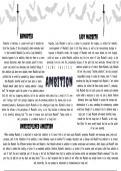Hamartia Lady MACBETH
'Hamartia' in literature, is a greek word used to describe the Arguably, Lady Macbeth is used as a device to precipitate the tragedy, as without her relentless
fatal flaw (usually of the protagonist), which eventually leads encouragement of Macbeth's plans to kill King Duncan, as well as her emasculating dialogue in
to their downfall. Macbeth's (as well as Lady Macbeth's) response to Macbeth's doubts, the tragedy of Macbeth could not ensue. Indeed, her own tragedy
hamartia happens to be ambition, which sets them on a course could not ensue, as unlike Macbeth, ambition was the true ruiner of Lady Macbeth's sanity, as she
towards destruction, where their constant pursuit for more eventually took her own life, presumably because of the guilt that had inevitably followed after her
power and control was ultimately their downfall. Perhaps if T H E M E A N A L Y S I S ambition spiralled out of control. Unlike Macbeth, Lady Macbeth
their ambition had been more subdued, where Macbeth had been did not only possess “vaulting ambition”, she also possessed
Ambition
satisfied that he would be succeeded by Banquo's descendents, unparalleled courage to realise her dreams, even if it meant
then Macbeth's downfall would not have been so severe. murdering the King. She recognised that Macbeth is "not without
Macbeth himself admits that his 'vaulting ambition' 'o'erleaps ambition, but without the illness should attend it", indicating
itself'. The metaphor paints the picture of an ambitious general that Macbeth does not quite possess her cunning and conniving
that not only has staggering ambition, but he has ambition which almost has a mind of it's own nature which is necessary to carry out such a murder. Ambition
and 'o'erleaps itself' into perhaps dangerous and all-consuming ambition. By having such an all- ultimately drives Lady Macbeth to possess the courage and
consuming hamartia, Shakespeare depicts Macbeth as the archetypal tragic hero. Macbeth's choice to determination of a man, something the contemporary audience
believe the witches is the peripeteias of Macbeth's story, as his fatal mistake in believing them led would have thought of as unnatural. Due to ambition being a
to his downfall, believing that “for none of woman born shall harm Macbeth.” Falling victim to large part of Lady Macbeth self-induced downfall, many
one's peripeteia is a common feature of a tragic hero. consider her the true tragic hero of 'Macbeth', as her tragic
flaw (thirst for more power) meant that she was the author
UNDISCIPLINED AMBITION of her own downfall.
When watching Macbeth, it is important to realise that 'ambition' in it's barest form is not what causes Macbeth's peripeteia. Macbeth's ever-increasing greed, pride and
paranoia, built on the foundation of his ambition, is what ultimately causes his downfall. For example, characters such as Banquo and Macduff had ambition to be revered
leaders like Macbeth. The difference between them and Macbeth is that Macbeth allowed his ambition to become unrestrained and venomous, whilst Banquo and Macduff were
not willing to sideline their nobility in favour of an unchecked ambition. Therefore, Macbeth's hamartia is a product of his excessive pride and greed, rather than ambition in
and of itself. The most regrettable part of the play is the fact that Macbeth knew that his ambition had become morbid and undisciplined. Macbeth commands “stars hide
your fires, let light not see my black and deep desires.” This is a clear recognition that his desires do not reflect who Macbeth was initially known to be: noble, honourable
and trustworthy. This can perhaps be interpreted as foreshadowing his tragic end.





